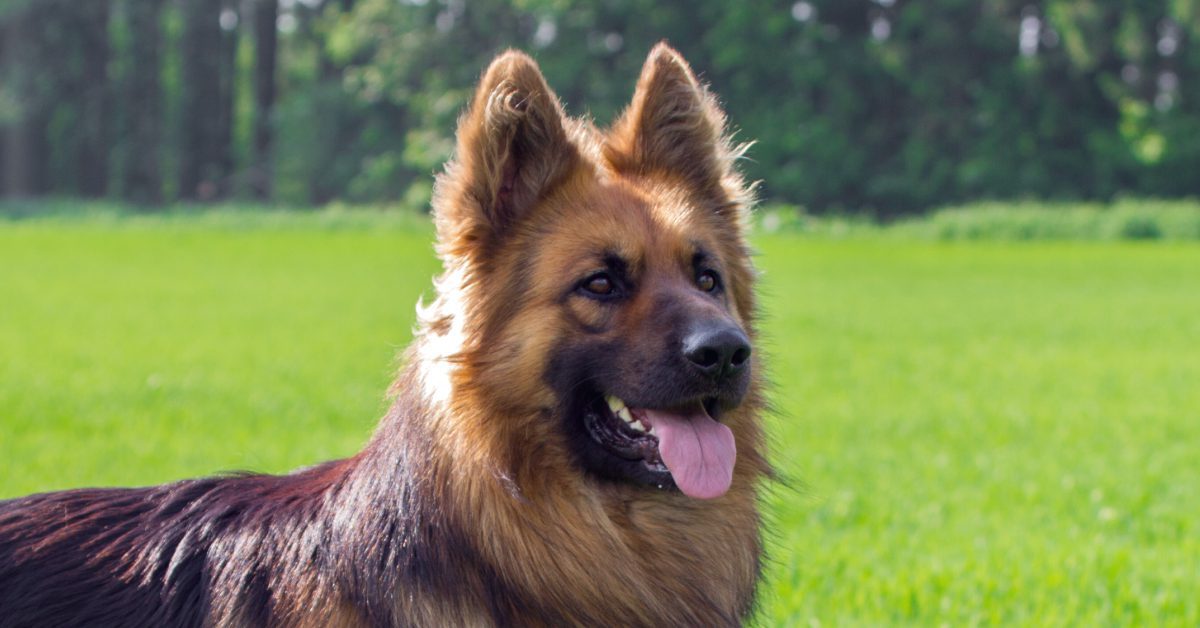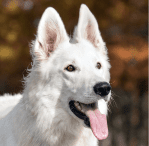
Meet the German Shepherd
High Doggy I.Q.
Top Working Dog
Best Workout Buddy
If you are a high-energy human looking for a loyal best friend who loves to be put to work, I am the breed for you! I have boundless energy, so it’s essential that I get a lot of daily exercise. I’m one of the smartest breeds around – which makes me easy to train – and my intelligence, bravery, and loyalty make me a great family dog. I also make an especially great watchdog since I would do anything to keep my humans safe. Some German Shepherds even work as professional service dogs, including police dogs, guide dogs, and sheepdogs! There’s not much out there we can’t do if we put our minds to it.
Whatever work I’m doing, I need lots of mental and physical activity to keep me happy and healthy, so I’ll do best in a home with humans who have time to play with me (and brush me – I can be a bit of a shedder). While I love playing with both big and little humans, I’m not always great with other dogs unless I’ve been socialized with them as a pup – then we can be BFFs. All that said, once I bond with my family, I will be everyone’s loyal and loving friend furever. After all, there’s a reason why I am the third most popular AKC dog breed!
Ready to learn more about me? Let’s dig in.
Ready to learn more about me? Let’s dig in.
 My Many Looks
My Many Looks

Black

White

Black & Tan

Sable
 My Breed Characteristics
My Breed Characteristics
 Furbulous Fact
Furbulous Fact
We German Shepherds have a lot of star power. Our ability to follow our humans’ commands make us great workers – even in Hollywood! Two of the earliest dog celebrities were German Shepherds. The first, Strongheart, came to the U.S. after serving in World War I. Strongheart starred in four movies in the 1920s, including White Fang (1925).. The second and most famous German Shepherd movie star was Rin Tin Tin , who was rescued after serving in World War I and became a huge hit in Hollywood, starring in 27 films during his career!
 As I Grow Up
As I Grow Up
As you can see, we German Shepherds age pretty gracefully. Here are a few key milestones in my growth & development to be aware of as I grow up from a pupper to an adult and senior!

Puppy4 Months
I am a loyal protector and need to be socialized early so I learn to trust my humans. Obedience training is also key – I can get destructive, anxious, or aggressive without it.

Adult2 Years
I’m a grown up, but still need lots of daily exercise and mental stimulation to keep me healthy and happy. I love to work, and I do best when I have a job to do!

Senior7-8 Years
I have less energy than I used to, but still need daily activity to keep me healthy. Try low-impact exercise like walks and swimming that don’t put extra strain on my joints.
 History of My Breed
History of My Breed
Compared to other breeds, we German Shepherds are pretty new. As you can tell from our name, we come from Germany. The first GSDs were bred by a human named Max von Stephanitz. In 1889, Captain Max went to a dog show in western Germany and was smitten by a sheepdog he saw there, so he took him home and our breed was born! Captain Max bred us for our intelligence and our ability to do any job our humans needed us to do. From the very beginning, we were some of the smartest, loyalest, and most hard-working puppers in the world.
My ancestors first came to the United States in the early 1900s, and it didn’t take long for humans in America to see how pawesome we are – our breed was officially recognized by the AKC in 1908. Our name was changed briefly during World War I against the Germans, with Americans calling us Shepherd Dogs and the British calling us Alsatian Wolf Dogs! But after WWI, where my brave ancestors served as military dogs, our popularity soared in the United States and elsewhere. Our smarts and good looks even made us popular as Hollywood stars! Our intelligence, work ethic, and loyalty to our humans has always made us a popular breed, both as family dogs and service dogs.
 Pawesome Pups to Parent
Pawesome Pups to Parent
In addition to purebred German Shepherds like me, there are tons of pawfectly sweet mixed-breed German Shepherd dogs that are looking to find their furever homes. You can learn where to find your next pet below!
 Care Tips
from Veterinarians
Care Tips
from Veterinarians 
Make sure your dog is properly screened for hip dysplasia.
German Shepherds have problems with hip dysplasia, and reputable breeders will screen for hip disease. Having X-rays performed at a young age can also be helpful to determine the health of your dog’s hips. - Michele King, DVM
Help your dog maintain a healthy body weight.
German Shepherds do well if kept at a healthy body weight. Because of their predisposition to hip problems, letting them get overweight can cause very serious issues. Maintaining the correct body weight is especially important in this breed. - Michele King, DVM
Take preventive measures to avoid bloat.
German Shepherds are a deep-chested breed and this makes them more prone to bloat (or gastric dilatation volvulus), which is a surgical emergency. A gastropexy surgery is a simple procedure to help prevent future bloating from becoming a life-threatening issue. Changes in the way you feed your dog (i.e. switching from an elevated bowl to floor feeding) may increase the risk of bloat, so stay consistent in the way you feed your dog. - Erica M. Irish, DVM
 Training Tips
from Trainers & Behavior Specialists
Training Tips
from Trainers & Behavior Specialists

Start positive reinforcement training early.
German Shepherds are really intelligent dogs and excel at being trained with positive reinforcement. Focus on teaching them what you want them to do using a gradual training plan, and they will get the hang of it really quickly. But you do need to motivate them so use treats like chicken, turkey, or cheese. Don’t make the mistake of using aversive methods because studies show this has risks including fear, aggression, and/or a worse relationship with their owner. - Zazie Todd, PhD
Keeping up the training will help prevent behavioral issues.
A German Shepherd puppy needs plenty of socialization at an early age to help them grow up happy and well-rounded. They should also be trained consistently throughout their lifetime to reduce behavioral issues, destructive behaviors, boredom, depression, and anxiety. These dogs are incredibly intelligent, loyal, and athletic. As such, they can be prone to anxiety, destructive behaviors, and even fear-based aggressive behaviors if not properly raised. - Jen Jones, Certified Dog Trainer

 Why Get Dog Insurance?
from Pumpkin®
Why Get Dog Insurance?
from Pumpkin®
German Shepherds are a generally healthy breed, but unexpected ruh-rohs can happen to any dog at any age. If your pup gets hurt or sick, pet insurance can help you say ‘yes’ to the best care, even when it’s costly. When it comes to shopping for this breed, you’ll want to choose insurance plans like Pumpkin's, which can help cover the costs associated with the hereditary conditions German Shepherds are prone to developing. While a reputable breeder will conduct genetic testing on your pup’s parents to help minimize the chances of passing down hereditary conditions – they can’t always be avoided. Let’s look at some common ones, and how Pumpkin Dog Insurance plans could help cover the cost of care!
 EPI
EPI
Exocrine Pancreatic Insufficiency is a condition where the pancreas can’t produce enough enzymes to digest fats, carbohydrates, and proteins, resulting in malnourishment. EPI can be treated medicinally with specialized food, vitamin supplements, and pancreatic enzyme replacement therapy, but the condition is lifelong and costs will be incurred on a yearly basis.
- Cost to Treat
- $500-$3,000/yr
- Pumpkin Pays Back*
- $450-$2,700
 Bloat
Bloat
Bloat (AKA Gastric Dilatation Volvulus) occurs when air, food, and fluids build in a dog's digestive tract, causing gastric rotation that shuts down the entrance and exit to the stomach. This can result in stomach rupture and infection, cardiovascular damage, and decreased delivery of nutrients to body tissue. Bloat is a life-threatening condition and needs to be treated immediately.
- Cost to Treat
- $2,500-$8,000
- Pumpkin Pays Back*
- $2,250-$7,200
 Hip Dysplasia
Hip Dysplasia
An orthopedic condition where the ball and socket of the hip joint doesn’t develop or work properly, leading to joint deterioration, pain, lameness, and/or arthritis. While mild cases can be managed with prescription meds and physical therapy, severe ones may require costly hip replacement surgery.
- Cost to Treat
- $1,500-$7,000 (surgical)
- Pumpkin Pays Back*
- $1,350-$6,300
 Elbow Dysplasia
Elbow Dysplasia
An orthopedic condition in which the abnormal development of the three bones making up the elbow joint causes them not to fit together properly, resulting in pain, lameness, and the development of arthritis. There are several forms of elbow dysplasia and surgery is often recommended.
- Cost to Treat
- $200-$3,000
- Pumpkin Pays Back*
- $180-$2,700
*Example illustrates reimbursement of a covered vet bill at a 90% reimbursement rate, where the annual deductible had already been satisfied and the annual limit had not yet been met. Coverage and reimbursement results vary based on policy options.




